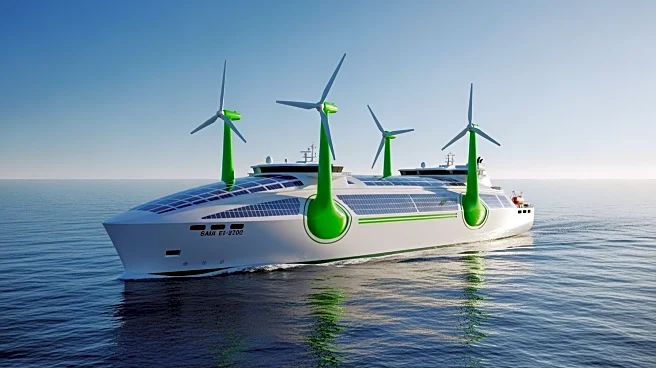What's Happening?
Major energy and commodity traders are taking significant steps to reduce the carbon footprint of their shipping operations. These companies, traditionally known for their large carbon emissions, are now investing in cleaner and more efficient shipping technologies.
This includes retrofitting older vessels and ordering new tankers equipped with clean fuel capabilities. The initiative is part of a broader industry effort to test and prove the viability of ammonia as a marine fuel. Companies like BGN International and Vitol are leading the charge by modernizing their fleets and implementing energy-saving technologies. These efforts align with the International Maritime Organization's (IMO) goal of reducing shipping's carbon intensity by 40% by 2030.
Why It's Important?
The involvement of energy traders in decarbonizing shipping is crucial for achieving global carbon reduction targets. By investing in greener shipping technologies, these companies are not only improving their sustainability credentials but also setting a precedent for the entire maritime industry. The shift towards cleaner fuels and more efficient vessels could significantly reduce emissions, benefiting the environment and aligning with international climate goals. This move also highlights the importance of cross-industry collaboration, as achieving decarbonization requires coordinated efforts from fuel suppliers, vessel operators, and regulators.
What's Next?
The continued investment in green shipping technologies by energy traders is expected to drive further innovation and collaboration within the maritime industry. As these companies work towards meeting the IMO's 2030 emission-reduction targets, they are likely to explore additional partnerships and technologies to enhance their sustainability efforts. The development of ammonia as a viable marine fuel will be closely monitored, with potential implications for global shipping practices. Stakeholders, including banks and maritime experts, are expected to support these initiatives, recognizing their contribution to sustainable development and innovation in the sector.
Beyond the Headlines
The push for greener shipping by energy traders could lead to long-term shifts in the maritime industry, influencing regulatory frameworks and market dynamics. As these companies leverage their financial networks and market knowledge, they may play a pivotal role in shaping the future of shipping. The transition to lower-carbon shipping practices could also impact global trade patterns and supply chain logistics, as more companies prioritize sustainability in their operations.















